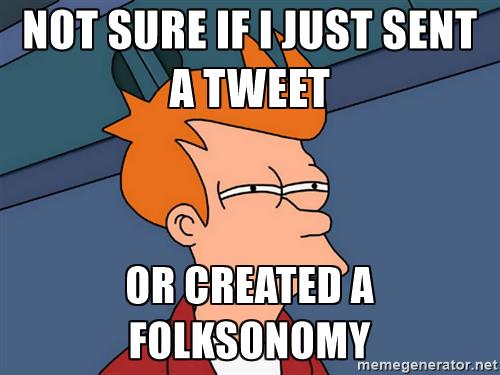
Are folksonomies useful? Sure. Yes.
Like time, it is a human construct. (These are the jokes…) These systems of classification are useful to us to organize and locate items on the internet. There is so much information out there – so much random data – that using tags, classification systems, keywords, metadata, all of these things lend themselves to being searchable content due to their classification systems. The internet being such a vast “sea of information” according to Dr. Bonnici, the only way that we are going to make sense of any of the pages or articles out there is to use a system that calls out small details of the information that users deem worthy, searchable. Enter metadata.
But yes, problems with these tags arise because they are user-generated. Although people are helping classify the information, they are also helping classify information off the cuff, and by their own system. There is no defined taxonomy. It is random, often wrong, or “clever” and not meant to be helpful. Much like everything about the internet, it is haphazard and user-generated, which is liberating and frustrating all in the same breath.
I have a love/hate relationship with the internet. Yes, I feel that it is useful, helpful, informative, connecting, empowering, and sometimes even fun. Yet, it is also often wrong, endlessly time-wasting, too-connecting, invasive, immature, and too anonymous. Folksonomies are a way to chain the beast, at least organizational-wise. It gives an overwhelming amount of data a place to go, it interprets their language for the readers and searchers, and it is generated in a narrow way, by the users who created the content or are familiar with it. Are they perfect? No. But it is all we have to translate the tangle of information before us.
You have some very profound thoughts in your analysis of folksonomies! I especially like your points about folksonomies being random and narrow. It’s interesting to me that we label and define folksonomies as external popular constructs when they’re allegedly started internally, in people’s own minds for their own purposes. And how can folksonomies be “folk” when the majority of people don’t even know what they are in theory or reality? I agree that they can be more people-friendly and empowering versus traditional classification schema, yet, in some sense, don’t folksonomies almost exist as a sidekick to traditional classification methods? Aren’t we still using DDC and LCC? And sometimes I really question if “folks” are generating folksonomies or if algorithms and bots are actually the puppet masters behind folksonomies. I think there are definitely still more questions than answers about folksonomies’ usefulness.
LikeLiked by 1 person
I think there are a several interesting thoughts here in the blog post and in CJ910’s comment. I also tend to look at folksonomies as a “sidekick” for traditional classification systems and I wonder if there might be a day in the future where that changes. And YES! often I too wonder what the algorithms are doing behind the scenes that affect what we see and consume. I feel like you can basically take any praise or criticism about the internet and replace the word “humanity” and keep the same themes.
LikeLiked by 1 person
I like your “sidekick” comment. That makes a lot of sense. A lot of criticisms about folksonomies compare them to strict classification and they obviously cannot measure up to that. A sidekick though, is a little snarky and fun and not doing the heavy lifting but still helping get stuff done.
LikeLiked by 1 person